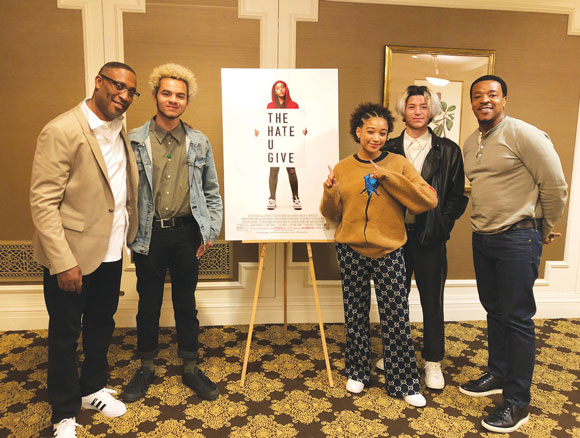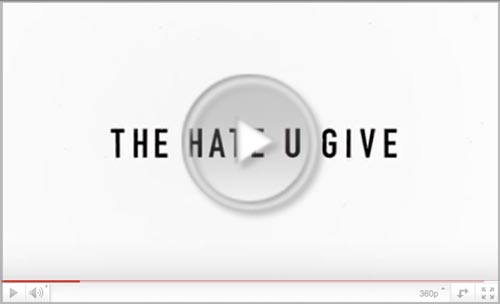ARTS & ENTERTAINMENT - October, 2018
The Hate U Give
FastForward talks with director George Tillman, and actors Amandla Stenberg and Actor Russell Hornsby
REPORTERS/WRITERS: BT Salle-Widelock, Dante Cokinos and Brandon Llamas (FROM: Marin School of the Arts and White Hill Middle School)
T he Hate U Give, directed by George Tillman Jr. is a powerful film adaptation of the book by Angie Thomas. Thomas, the author, was partially motivated to write her novel after a young person named Oscar Grant was shot at a BART (Bay Area Rapid Transit) station in Oakland by a BART police officer nine years ago. In the film, Starr, the lead character, played by Amandla Stenberg, sees her best friend, Khalil (Algee Smith) shot by a white police officer who thought Khalil’s hairbrush was a gun. She is the only eyewitness to the murder, but she is afraid to speak up. She attends a mostly white, private school, while living in a poor, black neighborhood with a lot of gang violence. Starr deals with pressure from all sides while balancing her two lives. Code-switching—when someone makes a hard flip between two lives—is a major topic of this production. The film has many strong emotional moments, but also several great moments of laughter in a powerful film that examines racial disparities. I recommend this movie to both teens and adults because it is an eye-opening ride through the life of young African-American girl. The film provides us the opportunity to hear a distinctive voice, a clear voice, a voice that is important to take in and reflect on.
THE INTERVIEW:
After attending the screening of this long awaited, politically powered drama, The Hate U Give, we interviewed Director George Tillman and two of the film’s starring cast members, Amandla Stenberg and Russell Hornsby. Within the film Stenberg plays Starr, a young black girl living in Garden Heights (a fictional neighborhood of Tillman’s creation), dealing with the stark differences between her life at home and the private school which she attends in the city outside her suburban climate. Hornsby plays her headstrong passionate father, Maverick. Tillman often utilizes this character to push forward one of the films main points: what it means to be black in current day America.
We sat at a roundtable with these three and soon delved deep into each of their individual processes used in this heavy-hitting project, learning what the film meant to them individually. Hearing them speak on their intent provided a greater context for a film that is culturally significant.
We were struck by the chemistry between the actors and actresses and asked how that was developed. Russell told us they first had a two-week rehearsal period where the cast as a family went out to dinner, watched family movies, played games like air hockey and found their own rhythms. He added, “I think the key component is there’s many actors who possess the talent, but very few who possess the humanity and spirit that these roles encompass. This is necessary, and as a result, everyone was able to give themselves over to the moment.”
Hornsby also explained that the source material was so rich, so layered and deeply drawn, as well as the script. He approached playing Amandla’s father as he had in theater when creating a theater character. He told us, “I sequestered myself for a month; and in 30 days of solitude where I looked at it as Mav’s bid, his incarceration moment in time, I read “Black Panther” books and listened to music and just started to layer this character—how he walked, how he talked, how he thought—creating an even deeper back story. So, when it was time to come to the set, all that’s ready and I can throw everything away and just be and just live.
Director George Tillman stressed that he worked hard to keep the translation from book to film as close Thomas’ story as he could. He said, “I had to ask myself, what is the objective? What do you want? How are you trying to get it? When you read the book, it sings. It’s character and personality, not all drama.”
In the end, Amandla Stenberg stressed that she believes you can take from the movie what you need, depending on who you are and what your experience is. She added, “I think the topic of code-switching is pretty universal and navigating different aspects of identity is something that a lot of people can relate to and feel validated by. I hope that this film specifically acts as a place for black communities to grieve, to feel seen and heard, to feel honored, and to honor and process their own experiences and their own families, because we don’t always get to do that as black communities. We’re always pushing through persecution.” Amandla thinks that we have become somewhat desensitized to these events and hopes that “seeing it in a personal narrative can maybe shift some lines around what these experiences must be like, or at least create some sort of empathy.” In terms of how it impacts film or Hollywood, she added, “I hope this further validates the notion that our stories are vivid and colorful and worthy of being told and that when you give us the room to express our artistry, we create something that is truthful.”


